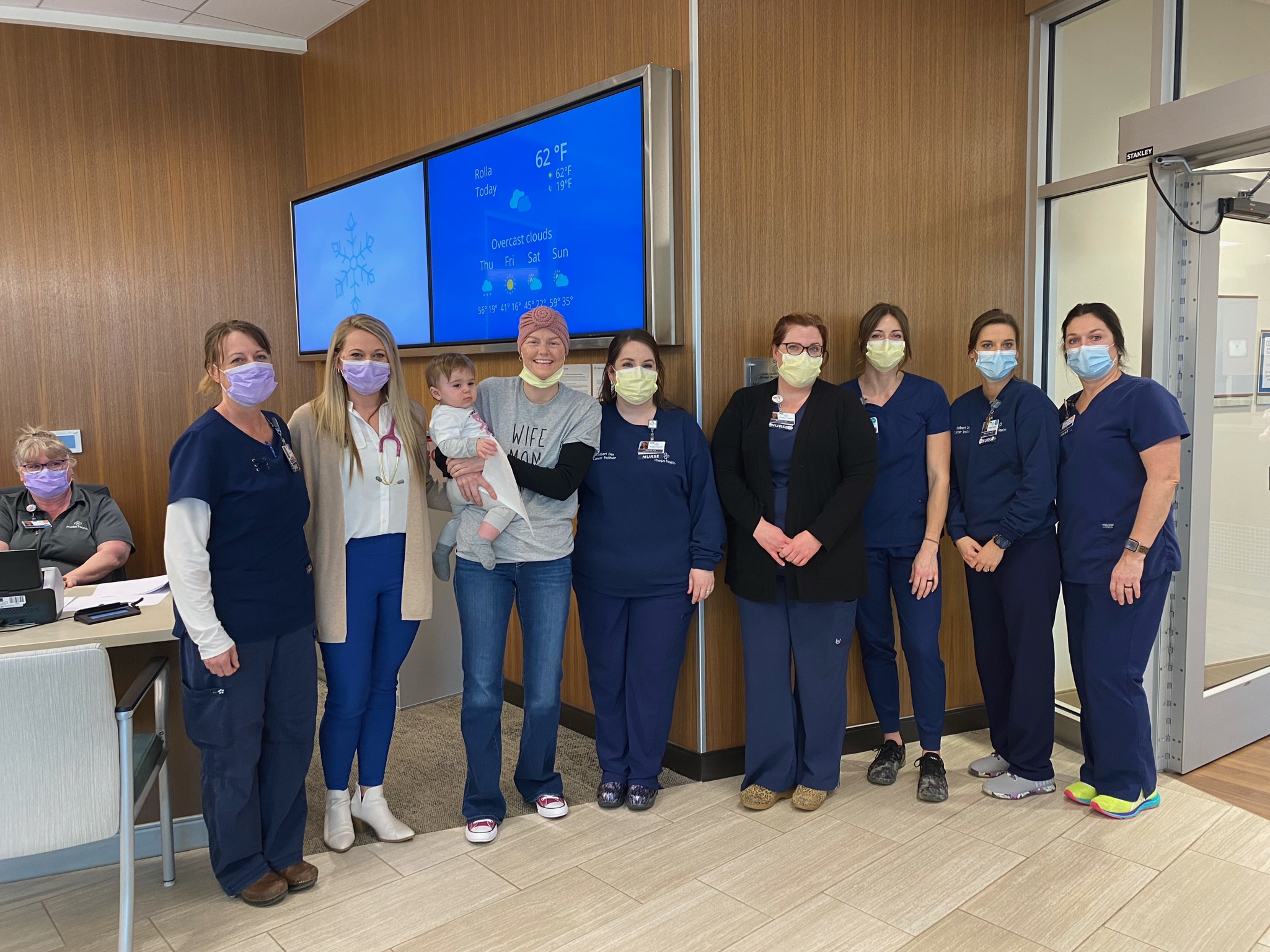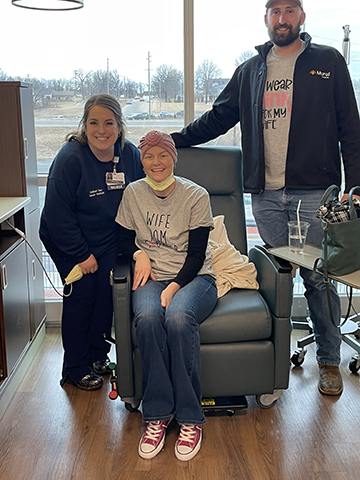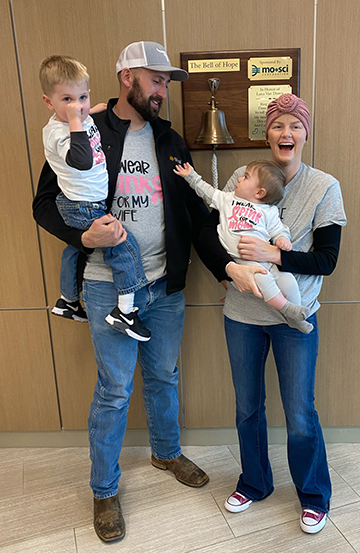
Published on September 30, 2022
Read Time: 6 Minutes
Stories of breast cancer usually start the same way: with a lump.
That was unfortunately the case for Sarah Snelson, of St. James, Missouri, who discovered a lump while breastfeeding her youngest son.
This latest change in her body came during a time of other major life changes.
“I had a baby, built a house and got cancer in the same year,” said Sarah, who was 28 years old when she was diagnosed with stage 3 breast cancer.
In addition to the lump, Sarah noticed other concerning symptoms.
“I just had a baby, so I wasn't really sure what to expect, but I was losing a lot of weight,” she said. “I was starting to feel sick a little bit but [I thought it was mostly from] having a baby.”
When she felt the lump, she suspected something was different.
After visiting her doctor, Sarah was referred to the Phelps Health Comprehensive Breast Center, where she underwent an ultrasound and a mammogram.
“They [Breast Center staff] were very easy to work with,” she recalled.
Both tests were completed in one day, and while Sarah was worried about doing these tests so quickly, she said she felt reassured by the staff’s calming manner.
Sarah returned the next day for a biopsy, and a sample of the lump was taken for testing. Soon afterwards, she received the news that not only had she tested positive for breast cancer, but the cancer had spread to her lymph nodes.
A cancer diagnosis is a life-altering experience. “Having to say you have cancer is very hard,” she said.
One in eight chance
According to the American Cancer Society, one in eight women will develop breast cancer during her lifetime. In fact, breast cancer is the most common cancer in women in the US after skin cancer.
Certain risk factors may increase a woman’s chances of getting breast cancer. Breast cancer can be hereditary as gene changes or mutations passed on from a parent can place a woman at higher risk for developing breast cancer.
After a blood test, Sarah learned that she has an inherited mutation to the breast cancer gene, BRCA, which she believes came from her father’s side of the family.

Her grandmother (her dad’s mother) lost her battle with breast cancer in her 30s. In addition, Sarah’s aunt also passed away from metastatic breast cancer (cancer that has spread to other parts of the body).
Despite her family history, Sarah said she didn’t think she would get breast cancer at a young age. Most cases of breast cancer are found in women ages 55 and older.
Quality cancer care, close to home
After learning of her diagnosis, Sarah said she wanted to receive care at the Phelps Health Delbert Day Cancer Institute (DDCI) in Rolla, Missouri.
Not only did she want to stay local, Sarah also wanted a caring doctor who would answer her questions. “I found that here at Phelps Health,” she said.
Sarah said she highly recommends the DDCI and always felt like she received a warm welcome from the doctors, providers and staff at Phelps Health.
For radiation therapy, Sarah saw Christopher Spencer, MD, MS, DABR, medical director of the DDCI and medical director of radiation oncology at Phelps Health.
Sarah also received care from Kan Huang, MD, PhD, MS, a medical oncologist and hematologist and medical director of the DDCI Infusion Center; and Logan Shockley, a certified family nurse practitioner (FNP-C) who specializes in medical oncology and hematology, at the DDCI.
“I had Dr. Huang, and she was incredible. She was full of knowledge and just made me feel like I was going to be OK. And Logan Shockley helped me through all the treatments and [answered] all my questions,” Sarah said.
In addition, Sarah mentioned receiving exceptional care from nurses Hillary Black and Tiffany Williams.
“All of them have been amazing,” she said, adding that when she was having a bad day, staff noticed and did what they could to make things better.
Individualized treatment plans
At the Phelps Health DDCI, an individualized treatment plan is developed for each cancer patient.
For Sarah, her treatment first involved about 5 months of chemotherapy. After the first two chemo sessions, her tumor shrank.
To make sure the breast cancer didn’t spread, she underwent a double mastectomy (surgical removal of both breasts) followed by around 6 weeks of radiation therapy. Sarah said the tumor was too big to perform a lumpectomy, where only a portion of the breast is removed.
These treatments took a toll on Sarah, who noted that recovering from the treatments’ side effects has been a struggle both physically and mentally.
“When I started treatment, I tried to power through it all, but [chemo] definitely knocks you down,” Sarah said, noting that chemotherapy drugs have strong effects.
Sarah said she was active before her cancer diagnosis. However, after treatments, she found it hard to lift a 5-pound bucket or a 30-pound child. She remembers not having any energy to hold her children and having to rely on the help of her and her husband’s parents.
In remission
According to her latest scans, Sarah no longer has any cancer in her body.
“I'm just taking medication to hopefully never have to go through this again. It’s been nice to not have an IV hooked into my body every week,” Sarah said.
Since being in remission, Sarah said she has done her best to return to her normal activities. She helps her husband, Casey, on the family farm and enjoys spending time with her two boys, watching them grow up.

Sarah said her youngest son – the one she was breastfeeding when she discovered the lump – has been called a lifesaver.
“I ate healthy. I exercised. I just never thought I would have something in my body trying to kill me, but I did. I do not think I would have found it [lump] if I was not breastfeeding,” she said.
Even after finding the lump, Sarah initially ignored it for a few weeks.
“I wish I didn't because I wondered if it [cancer] would have been stage 1 or stage 2. Mine was an aggressive cancer, and it was just growing very fast,” she said.
Sarah offered the following advice for others: Don’t ignore anything, no matter your age.
“If you think something's wrong, don't doubt it,” Sarah said. “Just go get checked out because if I were to give it another week or two, who would have known [what the outcome would be?]”
Schedule Your Mammogram Today
The best prevention is early detection. Get screened. The American College of Radiology recommends yearly mammograms starting at age 40 or earlier if you have an immediate family history of breast cancer. To schedule a mammogram at the Phelps Health Comprehensive Breast Center, call Centralized Scheduling at (573) 458-7737.